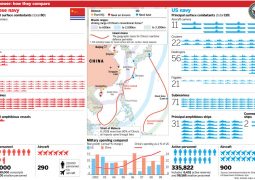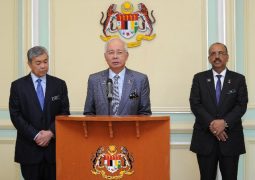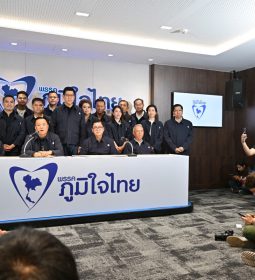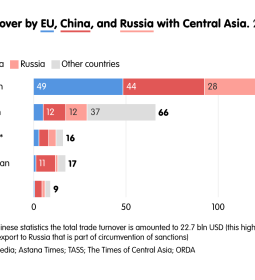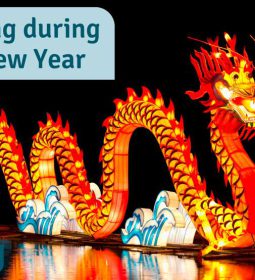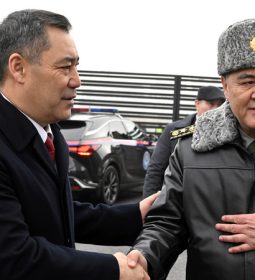China, Malaysia exchange 9 MOUs, agreements
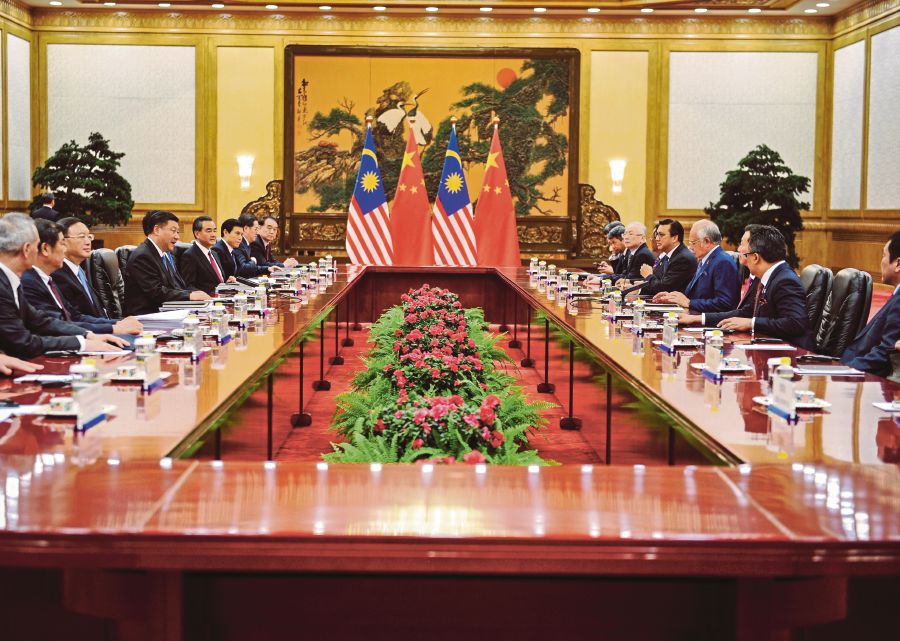
TBEIJING, May 14 (Bernama) — Nine business agreements were signed here on Sunday between Malaysian and Chinese companies with proposed investments estimated at US$7.22 billion (about RM31.3 billion).
The memoranda of understanding (MoUs) are for various sectors particularly construction, agriculture, stock exchange, infrastructure and port and airport cooperation.
The signing ceremony for the various agreements was witnessed by Prime Minister Datuk Seri Najib Tun Razak.
Most of the projects will be carried out in Malaysia.
The highest investment is for the Strategic Alliance Agreement between Johor Corporation and Siasun Robot Investment Co. Ltd to develop 400 hectares of land for the Robotic Future City in Johor worth US$3.458 billion (RM15 billion).
The futuristic city aims to develop the robotic industry and at the same time spur the growth of various supply chains in Malaysia.
Another MoU is for the development of a methanol and derivatives complex in Tanjung Kidurong, Bintulu, Sarawak, costing US$2 billion (RM8.69 billion).
It was between Yayasan Hartanah Bumiputera Sarawak, Consortium of Huanqiu Contracting & Engineering Co, and MACFeam Sdn Bhd.
The project is estimated to be completed by 2021.
Another MoU is between KAJ Development and Power China, Shenzhen Yantian Port Group and Rizhao Port Group, to jointly develop Melaka Gateway as a mixed development comprising four islands for tourism, smart-city and commercial hub, deep sea port, shipbuilding and repair services and maritime industrial park.
The gross development value of Melaka Gateway is US$6.92 billion (RM30 billion) as of November 2016.
A cooperation agreement was also signed to promote and develop the Malaysian Innovation Cluster within the China-Malaysia Qinzhou Industrial Park.
Agrofresh International Sdn Bhd and Dashang Co.Ltd signed an exclusive agent agreement for the supply of Cavendish Banana and Tropical Fruits, worth US$1.53 billion (RM6.65 billion).
The investment for a mixed development , “The Shore” in Kota Kinabalu, Sabah is valued at US$132.58 million (RM575.93 million).
The Shanghai Stock Exchange will collaborate with Bursa Malaysia Bhd in exploring potential ways to improve market accessibility and products in both markets.
Also present were Sarawak Chief Minister Datuk Amar Abang Johari Tun Openg, Melaka Chief Minister Datuk Seri Idris Haron and Prime Minister’s Special Envoy to China Tan Sri Ong Ka Ting.
Meanwhile, AirAsia Bhd signed an MoU with China Everbright Group and Henan Government Working Group to establish a low-cost carrier in China.
— BERNAMA
he proposed investments of these arrangements were estimated at RM31.26 billion.
AirAsia Berhad exchanged an MoU with China Everbright Group and Henan Government Working Group to establish a low-cost carrier (LCC) in China.
The MoU outlines how the parties will incorporate a joint venture to be known as AirAsia (China) for the purposes of operating a low-cost aviation business based in Zhengzhou, the capital of Henan province in central China.
In addition, AirAsia (China) will invest in aviation infrastructure, including a dedicated LCC terminal at Zhengzhou airport and an aviation academy to train pilots, crew and engineers, as well as maintenance, repair and overhaul (MRO) facilities to service aircraft.
The MoU was exchanged between AirAsia Group CEO Tony Fernandes, Everbright Financial Investment Holding Executive Director and President Wang Weifeng and Henan Airport Group General Manager Li Weidong at China World Hotel here today.
Fernandes said: “We chose Zhengzhou as our base due to its strategic location and importance as a logistics hub. As China’s gateway to Europe, Zhengzhou sits at the centre of a vast rail, highway and air transport network that forms the linchpin of China’s development plans for its central and western regions. With President Xi Jinping’s vision for One Belt, One Road, Zhengzhou is set to become even more important, not least as the heart of low-cost air travel in North Asia.”
AirAsia was the first foreign LCC to enter China and has carried more than 40 million guests since its inaugural route to China in April 2005.
The other MoUs are from various sectors such as construction, agriculture, stock exchange, infrastructure, and port cooperation.
The investment projects in Malaysia include Melaka Gateway in Melaka, Robotic Future City in Johor Baru, and the Methanol and Derivatives Project in Sarawak.
Prime Minister Datuk Seri Najib Razak joined 20 over other world leaders today for the two-day Belt and Road Forum for International Cooperation (BRF) at the China National Convention Centre.
The opening ceremony was by Chinese president Xi Jinping, who conceptualised the One Belt, One Road (OBOR) or Belt and Road Initiative (BRI) in 2013.
The forum, with the theme Cooperation for Common Prosperity, is the highest-level dialogue since the vision of OBOR was first shared by Xi.
Xi, in his keynote address, gave a historical summary of the establishment of ancient Silk Roads which helped open windows of friendly exchange.
“These routes enabled the people to interact with each other with mutual respect in the pursuit of prosperity.”
As history was the best teacher, Xi underscored the importance of embarking on a path of peace, harmony, friendship and a better future.
With Najib at the forum were the Prime Minister’s Special Envoy to China Tan Sri Ong Ka Ting, Second International Trade and Industry Minister Datuk Seri Ong Ka Chuan, Agriculture and Agro-based Industry Minister Datuk Seri Ahmad Shabery Cheek, Minister in the Prime Minister’s Department Datuk Seri Dr Wee Ka Siong, and Transport Minister Datuk Seri Liow Tiong Lai.
The initiative aims to integrate the economies of Europe, Asia and Africa through an unprecedentedly powerful network of transport and communications infrastructure.
OBOR has won support from over 100 countries, and international organisations, with nearly 50 cooperation agreements signed between governments on joint construction of the route.
Beside 29 heads of state and government, BRF is also attended by some 80 leaders of international organisations.
Beside Najib, other leaders attending are Russian President Vladimir Putin, Indonesian President Joko Widodo, Philippine President Rodrigo Duterte, Vietnamese President Tran Dai Quang, Cambodian Prime Minister Hun Sen and Myanmar State Counsellor Aung San Suu Kyi.
Also present are the United Nations secretary-general, and presidents of the International Monetary Fund and World Bank.
After the opening ceremony, there will be high-level plenary sessions, as well as six parallel thematic meetings based on Connectivity of Development Policies and Strategies; Infrastructure Connectivity; Trade Connectivity; Financial Connectivity; People-to-People Connectivity; and Think Tank Exchanges.
The Malaysian delegation will take part in the sessions.
Later tonight, the prime minister and wife Datin Seri Rosmah Mansor will attend a welcome dinner hosted by Xi at the Great Hall of the People, and enjoy a cultural performance at the National Center for the Performing Arts.
Tomorrow, a Leaders’ Roundtable will be held at the Yanqi Lake International Convention Centre in the northern suburb of Beijing.
Najib will take part and share his views in some of the sessions.
Under the OBOR initiative are the Silk Road Economic Belt and 21st Century Maritime Silk Road.
Reaching from east to west, the Silk Road Economic Belt will extend to Europe through Central Asia and the 21st Century Maritime Silk Road will link sea lanes to Southeast Asia, the Middle East and Africa.
Retracing the ancient silk and spice trade routes, OBOR seeks to reopen the economic corridors and re-energise the commercialism that once drew principalities near and far to the Middle Kingdom.
If actualised, the OBOR initiative will become an integrated economic zone unprecedented in scale, with the potential to positively impact a third of the world’s population.
- Previous Saudis to boost US ties with $40bn investment
- Next China defends military ties with Sri Lanka after submarine visit blocked



